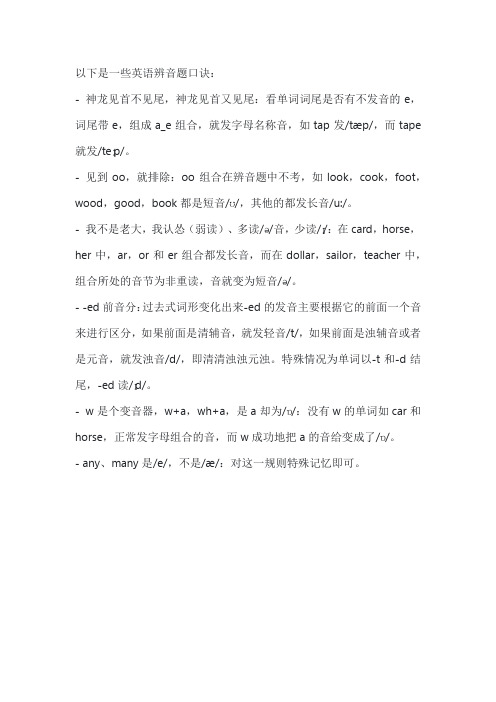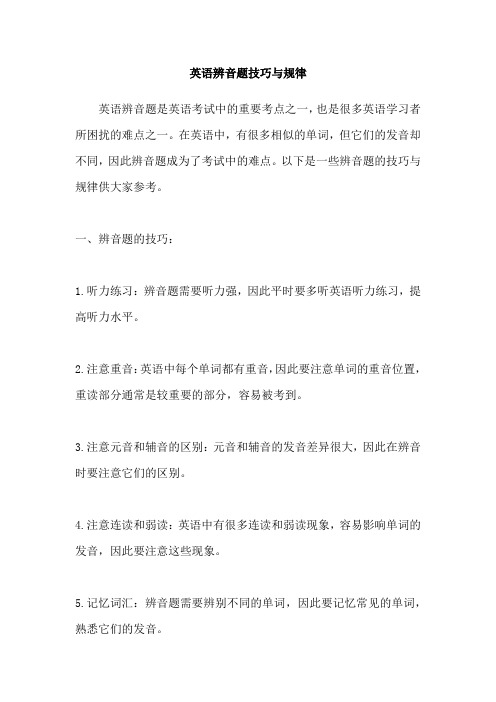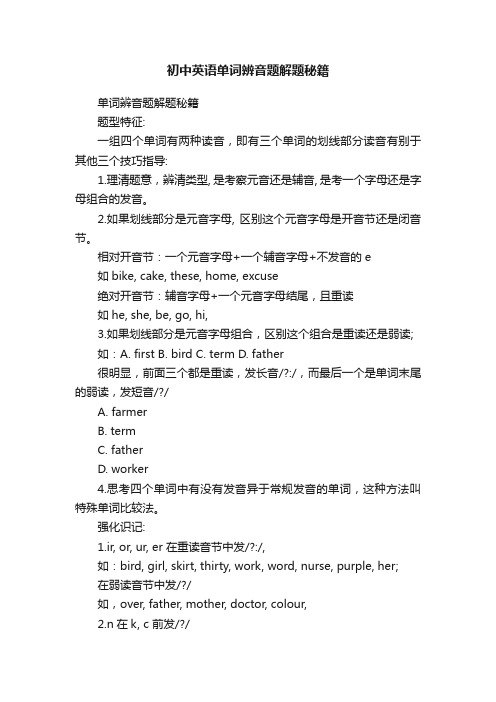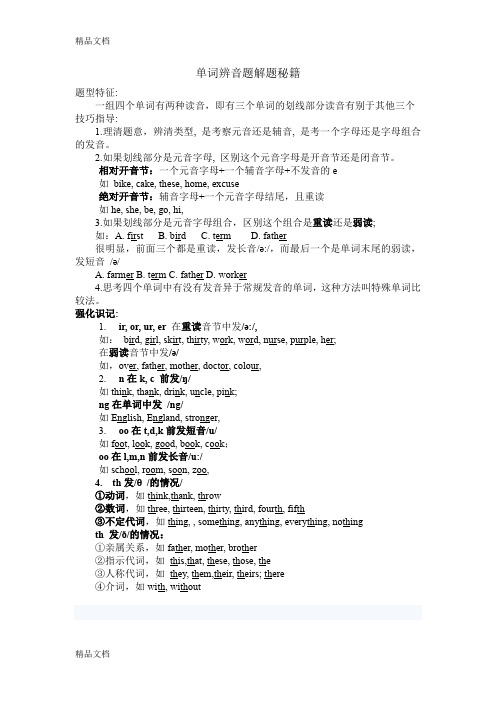初中英语单词辨音题解题秘籍
- 格式:pdf
- 大小:26.75 KB
- 文档页数:3

英语辨别发音题目做题技巧
在做英语辨别发音题目时,可以遵循以下技巧来提高你的准确率和效率:
1. 充分准备:在开始做题前,确保你熟悉题目要求的音标符号和音素。
这将有助于你在听到发音时迅速辨认出对应的音素。
2. 保持专注:当你听到一个单词的发音时,全神贯注地聆听并分析每一个音节。
尝试将每个音素与你已知的音标符号相匹配。
3. 多练习:多听英语单词的发音,并试着模仿。
多次练习可以提高你的发音辨别能力,并帮助你更快地识别和理解发音细节。
4. 找出规律:注意发音中的规律和特点,如元音和辅音的组合方式、重音位置等。
这将有助于你更快地辨认单词的发音。
5. 利用选项:当你不确定某个发音时,可以通过排除法来缩小选项范围。
如果题目是多选题,可以将听到的音素与选项中的单词逐一比较,找出最接近的答案。
6. 保持耐心:辨认发音需要时间和耐心。
如果你在某道题目上遇到困难,不要气馁,继续尝试并分析发音。
7. 及时复习:在做完题目后,对错题进行复习,分析自己在哪些方面出现了问题,并加强相应的学习。
这将有助于你在以后的练习中提高准确率。
8. 拓展词汇量:提高自己的词汇量有助于更好地辨认发音。
在日常生活中,多阅读英语文章并积累生词,可以提高你在做发音辨认题目时的准确率。

以下是一些英语辨音题口诀:
- 神龙见首不见尾,神龙见首又见尾:看单词词尾是否有不发音的e,词尾带e,组成a_e组合,就发字母名称音,如tap发/tæp/,而tape 就发/teɪp/。
- 见到oo,就排除:oo组合在辨音题中不考,如look,cook,foot,wood,good,book都是短音/ʊ/,其他的都发长音/u:/。
- 我不是老大,我认怂(弱读)、多读/ə/音,少读/ɪ/:在card,horse,her中,ar,or和er组合都发长音,而在dollar,sailor,teacher中,组合所处的音节为非重读,音就变为短音/ə/。
- -ed前音分:过去式词形变化出来-ed的发音主要根据它的前面一个音来进行区分,如果前面是清辅音,就发轻音/t/,如果前面是浊辅音或者是元音,就发浊音/d/,即清清浊浊元浊。
特殊情况为单词以-t和-d结尾,-ed读/ɪd/。
- w是个变音器,w+a,wh+a,是a却为/ɒ/:没有w的单词如car和horse,正常发字母组合的音,而w成功地把a的音给变成了/ɒ/。
- any、many是/e/,不是/æ/:对这一规则特殊记忆即可。

划线部分发音不同的单词答题技巧
1. 嘿,首先你得仔细听啊!就像听音乐一样,要专注才能分辨出不同。
比如说“cat”和“hat”,不仔细听能发现它们中间那个元音发音的不同吗?
2. 哇哦,要对那些相似但又有区别的音保持敏感度呀!好比“ship”和“sheep”,这可很明显呢,对吧?
3. 嘿呀,别着急下结论,多在嘴里念叨几遍。
像“bit”和“bite”,慢慢
感觉就出来了嘛!
4. 哎呀,把单词放在句子里去体会呀!比如“Look at that book.”和“Cook the food.”,这样更容易察觉发音不同哟!
5. 嘿,注意那些容易混淆的地方呀,这可很关键呢!像“thin”和“thing”,是不是一不小心就会弄混呀?
6. 哇,发音要有那种感觉,知道吧!就像“pen”和“hen”,感受一下它们发音的独特韵味。
7. 嘿哟,多练习才能熟练掌握呀!想想“leaf”和“leave”,只有不断练
习才能准确区分嘛!
总之,只要用心,注意这些技巧,就一定能轻松应对划线部分发音不同的单词啦!。

七年级下册第七单元单词辨音题的解答方法解答七年级下册第七单元的辨音题,可以按照以下的步骤进行:第一步:仔细阅读题目首先,要认真阅读题目,了解题目要求。
辨音题通常会给出一组单词,要求辨别其中某两个单词的发音是否相同或者不同。
了解题目要求后,才能有针对性地解答题目。
第二步:分析单词的音标辨音题通常会给出每个单词的音标,所以在解答之前,需要对单词的音标进行分析。
音标是一种标记系统,用来表示语音中的音素。
通过对音标的分析,可以更好地理解单词的发音规则和特点。
第三步:比较单词的音标在对单词的音标进行分析之后,可以开始比较单词的音标。
对于要辨别是否相同的单词,可以逐个比较它们的音标。
注意观察音标中的元素,如元音和辅音的位置和特点。
如果两个单词的音标完全相同,说明它们的发音也相同;如果音标不同,说明它们的发音也不同。
第四步:听音辅助判断在比较音标的基础上,可以通过听音来辅助判断。
有的辨音题会提供音频材料,可以仔细听每个单词的发音,并对比它们的音标。
如果听到的发音与音标一致,说明它们的发音相同;如果听到的发音与音标不一致,说明它们的发音不同。
第五步:反复确认答案在完成以上的步骤后,可以根据分析和判断得出答案。
但为了确保答案的准确性,可以再次反复确认。
重新阅读题目要求,检查自己的答案是否与题目要求一致。
同时,可以再次听音并比较音标,确保答案的正确性。
最后,写下你的解答。
在解答时,可以简洁明了地列出要辨别的单词,并注明它们的发音是否相同或不同。
同时,可以附上简单的解释或理由,说明你的答案是如何得出的。
通过以上的步骤,可以有条理地解答七年级下册第七单元的辨音题。
同时,这种方法也可以应用于其他辨音题目的解答过程中。

(完整版)初中英语冠词辨音题解题秘籍1. 简介本文档为初中英语冠词辨音题解题秘籍的完整版,旨在帮助学生提高冠词辨音的能力。
以下是一些简单的策略和技巧,可以帮助你更好地辨别不同单词中的冠词发音,以便正确回答相关问题。
2. 冠词的基本知识冠词在英语中是指用于限定名词的词语,包括定冠词 "the" 和不定冠词 "a/an"。
冠词在单词的发音上存在一些规律和变化,需要我们注意。
3. 规律和技巧- 定冠词 "the":在发音上,"the" 的元音音素通常是 /ði/(如"the apple" 中的 /ði æpl/),但在后面接以辅音音素开头的单词时,发音为 /ðə/(如 "the dog" 中的 /ðə dɒg/)。
定冠词 "the":在发音上,"the" 的元音音素通常是 /ði/(如 "the apple" 中的 /ði æpl/),但在后面接以辅音音素开头的单词时,发音为 /ðə/(如 "the dog" 中的/ðə dɒg/)。
- 不定冠词 "a/an":在发音上,"a" 通常发音为 /ə/,而 "an" 通常发音为 /æn/。
具体是选择 "a" 还是 "an",取决于接下来的单词的发音。
不定冠词 "a/an":在发音上,"a" 通常发音为 /ə/,而 "an" 通常发音为 /æn/。
具体是选择 "a" 还是 "an",取决于接下来的单词的发音。

英语辨音题技巧与规律英语辨音题是英语考试中的重要考点之一,也是很多英语学习者所困扰的难点之一。
在英语中,有很多相似的单词,但它们的发音却不同,因此辨音题成为了考试中的难点。
以下是一些辨音题的技巧与规律供大家参考。
一、辨音题的技巧:1.听力练习:辨音题需要听力强,因此平时要多听英语听力练习,提高听力水平。
2.注意重音:英语中每个单词都有重音,因此要注意单词的重音位置,重读部分通常是较重要的部分,容易被考到。
3.注意元音和辅音的区别:元音和辅音的发音差异很大,因此在辨音时要注意它们的区别。
4.注意连读和弱读:英语中有很多连读和弱读现象,容易影响单词的发音,因此要注意这些现象。
5.记忆词汇:辨音题需要辨别不同的单词,因此要记忆常见的单词,熟悉它们的发音。
二、辨音题的规律:1.相似词汇:英语中有很多相似的单词,容易混淆,比如'whether'和'weather'、'buy'和'by'等。
这些单词的区别通常在于元音和辅音的不同。
2.前后缀:英语中的前后缀通常有固定的发音规律,比如'un-'通常发[n],'-ed'通常发[d]或[t]等。
3.时态和语态:英语中的时态和语态也会影响单词的发音,比如'live'和'lived'、'read'和'read'等。
4.异形同音词:英语中有很多异形同音词,它们的意思不同但发音相同,比如'meet'和'meat'、'flour'和'flower'等。
以上是英语辨音题的一些技巧与规律,希望对大家有所帮助。
在备考中,除了平时多练习外,还可以通过听力训练、词汇记忆等方法提高辨音能力。

单词辨音题解题总结单词辨音题解题题型特征:一组四个单词有两种读音,即有三个单词的划线部分读音有别于其他三个技巧指导:1.理清题意,辨清类型, 是考察元音还是辅音, 是考一个字母还是字母组合的发音。
2.如果划线部分是元音字母, 区别这个元音字母是开音节还是闭音节。
[相对开音节:一个元音字母+一个辅音字母+不发音的e]如bike, cake, these, home, excuse[绝对开音节:辅音字母+一个元音字母结尾,且重读]如he, she, be, go, hi,3.如果划线部分是元音字母组合,区别这个组合是重读还是弱读;如:A. first B. bird C. term D. father很明显,前面三个都是重读,发长音/?:/,而最后一个是单词末尾的弱读,发短音/?/例题: A. farmer B. term C. father D. worker 答案:B4.思考四个单词中有没有发音异于常规发音的单词,这种方法叫特殊单词比较法。
强化识记:1.ir, or, ur, er 在重读音节中发/?:/, (字母常在单词中间)如:bird, girl, skirt, thirty, work, word, nurse, purple, her;在弱读音节中发/?/,(字母常在单词末尾)如,over, father, mother, doctor, colour,2.n在k, c 前发/?/,如think, thank, drink, uncle, pink;ng在单词中发/ng/,在末尾多发/?/如English, England, stronger;thing3.oo在t,d,k前发短音/u/,如foot, look, good, book, cook;oo在l,m,n前发长音/u:/,如school, room, soon, zoo,4. th发/θ/的情况/①动词,如think,thank, throw②数词,如three, thirteen, thirty, third, fourth, fifth③不定代词,如thing, , something, anything, everything, nothingth 发/?/的情况:①亲属关系,如father, mother, brother②指示代词,如this,that, these, those, the③人称代词,如they, them,their, theirs; there④介词,如with, without4. ch读/t?/;ck 读/k/; ph读/f/; sh 读/?/; wh读/w/;5.记住这些字母组合不同的发音情况!ea: heat seat leave lead breathe /i:/head bread spread /e/great break steak /ei/forehead /i/ou: group soup route /u:/mouth south loud /au/southern country young /?/shoulder soul /?u/au: aunt laugh /a:/autumn cause fault /?:/ie: piece niece field /i:/cities ladies /i/friend /e/lie tie /ai/ee: fleet sleet coffee /i:/ei: weight feint /ei/receive deceive seize ceiling veiling receipt /i:/height reich((德)帝国) /ai/foreign /i/sovereign (君主) /i/oo: good book cook /u/food cool food /u:/blood flood /?/ear: hear clear fear gear beard tear /i?/bear pear wear tear /ε?/heard /?:/heart /a:/our: hour flour sour /au?/honour colour /?/journal journey /?:/tourist /u?/pour mourn(哀悼) /?:/nourish(养育, 施肥) flourish(兴旺) /au/ur: turn nurse hurt surface /?:/surprise survive surplus /?/al: half calm palm /a:/wall call fall /?:l/chalk talk walk /?:/ng: finger longer younger /?g/singer /?/th: bath path breadth cloth /θ/breathe bathe clothes /ð/ch: teacher research machine technical /k/ tion: suggestion question /??n/sion: revision television /??n/ed: asked looked stopped /t/naked /id/wanted needed /id/c, g, s, x: city decide nice bicycle /s/courage cave curious cream /k/exercise exit text /ks/ example examination exist exact /gz/ g: age giant luggage village technology huge /d?/ bag pig hug egg /g/s: fast maps grass /s/reason nose /z/measure pleasure occasion /?/b: climb lamb subtle doubt tomb comb bomb 不发音h: hour honor honest exhibition 不发音w: answer sword write two wrong 不发音k: knife knee knock know kneel 不发音练习题一、判断下列各词划线部分发音是否相同,相同的打“√”,不同的打“×”。

初中英语单词辨音题解题秘籍单词辨音题解题秘籍题型特征:一组四个单词有两种读音,即有三个单词的划线部分读音有别于其他三个技巧指导:1.理清题意,辨清类型, 是考察元音还是辅音, 是考一个字母还是字母组合的发音。
2.如果划线部分是元音字母, 区别这个元音字母是开音节还是闭音节。
相对开音节:一个元音字母+一个辅音字母+不发音的e如bike, cake, these, home, excuse绝对开音节:辅音字母+一个元音字母结尾,且重读如he, she, be, go, hi,3.如果划线部分是元音字母组合,区别这个组合是重读还是弱读;如:A. first B. bird C. term D. father很明显,前面三个都是重读,发长音/?:/,而最后一个是单词末尾的弱读,发短音/?/A. farmerB. termC. fatherD. worker4.思考四个单词中有没有发音异于常规发音的单词,这种方法叫特殊单词比较法。
强化识记:1.ir, or, ur, er 在重读音节中发/?:/,如:bird, girl, skirt, thirty, work, word, nurse, purple, her;在弱读音节中发/?/如,over, father, mother, doctor, colour,2.n在k, c 前发/?/如think, thank, drink, uncle, pink;ng在单词中发/ng/如English, England, stronger,3.oo在t,d,k前发短音/u/如foot, look, good, book, cook;oo在l,m,n前发长音/u:/如school, room, soon, zoo,4. th发/θ/的情况/①动词,如think,thank, throw②数词,如three, thirteen, thirty, third, fourth, fifth③不定代词,如thing, , something, anything, everything, nothingth 发/e/的情况:①亲属关系,如father, mother, brother②指示代词,如this,that, these, those, the③人称代词,如they, them,their, theirs; there④介词,如with, without特殊单词辨音小结:常考!务必记好!单词辨音题解题秘籍(连载三)我们的目标是:攻克单词辨音!下面,就是我们的重磅炸弹!搞清楚这些“炸弹”以后,加上平时一定要注意积累,相信一定能在这道题上拿到80%到100%的分数。

解答英语辨音题要从三个方面入手,一是把握辨音题的类型,二是学会解题方法,三是牢记字母组合规律。
一、辨音题的类型
辨音题大体上可以分为两种:
1、给出一个单词,让我们从后面四个选项中找出一个与所给单词划线字母发音相同的一项。
2、四个划线单词,找出一个发音与其他三个不同的选项。
二、解题方法与技巧
1、认真审题,搞清楚题目类型,是让你找不同还是找相同;是一个字母的发音还是字母组合的发音。
2、利用开音节和闭音节规律弄清楚字母的发音。
3、对于字母组合的发音,要区分是重读还是弱读。
4、特殊词。
要考虑到题目所给单词有没有不同于发音规律的单词。

(完整版)初中英语副词辨音题解题秘籍本文将提供一份初中英语副词辨音题解题的秘籍,旨在帮助学生更好地掌握副词音标和发音规律。
以下是一些简单而有效的策略:1. 监听和模仿首先,要注意副词的正确发音,可以通过大量的听力练来熟悉和模仿。
多听英语副词的真人发音,并尝试模仿其发音,注意语音的重音和语调。
2. 区分发音规律副词辨音题中经常出现的问题是相似发音的副词区分。
考生应该学会区分发音规律,注意不同副词之间的细微差异。
以下是一些常见的发音规律:- 以 "-ly" 结尾的副词通常发音为 /li/,例如:really、likely。
- 以 "-ally" 结尾的副词通常发音为 /əli/,例如:actually、naturally。
- 以 "-ily" 结尾的副词通常发音为 /ili/,例如:happily、quickly。
3. 利用音标副词发音的音标是解决辨音题的关键。
学生需要熟悉副词常见的音标,并能够准确地将其与实际发音联系起来。
以下是一些常见音标的副词示例:- /li/: really、quickly- /əli/: actually、naturally- /ili/: happily、rapidly4. 练辨音题最后,为了提高对副词的辨音能力,学生应该多做练题。
可以从教科书、题集或在线资源中找到相关的练题,并按照以上策略进行练和解题。
以上是初中英语副词辨音题解题秘籍的简要概述。
通过听力练,研究发音规律,熟悉音标,并进行大量的练,学生可以更好地掌握副词的发音和辨音能力。
希望这份秘籍对你有所帮助!。

英语辨别发音题目做题技巧
英语辨别发音题目在语言学习和考试中非常常见,对于掌握英语发音至关重要。
以下是一些做题技巧,可以帮助你更好地应对英语辨别发音题目。
1. 学习音标
音标是学习英语发音的基础,学习音标可以帮助你准确地发音。
熟练掌握音标可以帮助你更好地理解发音规则和原则,提高辨别发音的能力。
2. 注重细节
在做英语辨别发音题目时,需要注重细节。
不同的音节、单词和语境都可能影响一个音的发音。
因此,需要仔细听取每个音的发音,注意细微的变化。
3. 识别重音
在英语中,重音的位置对于发音和意义都有很大的影响。
因此,在做英语辨别发音题目时,需要注意识别单词中的重音,以便更好地理解发音。
4. 建立联想
英语中的一些音和某些单词或词组有关联,建立这些关联可以帮助你更好地记忆和辨别发音。
例如,单词“kite”和“light”中的“i”音相同,单词“cat”和“bat”中的“a”音相同。
5. 练习发音
最好的方法是通过练习来改善你的英语发音。
练习可以帮助你更好地记忆发音和规则,并提高你的听力和口语技能。
你可以通过模仿音频、听取英语广播、看英语电影和与英语母语者交流来练习你的发音。
总之,以上是一些做英语辨别发音题目的技巧。
通过学习音标、注重细节、识别重音、建立联想和练习发音,你可以更好地掌握英语发音,提高你的英语听力和口语技能。

单词辨音题解题秘籍题型特征:一组四个单词有两种读音,即有三个单词的划线部分读音有别于其他三个技巧指导:1.理清题意,辨清类型, 是考察元音还是辅音, 是考一个字母还是字母组合的发音。
2.如果划线部分是元音字母, 区别这个元音字母是开音节还是闭音节。
相对开音节:一个元音字母+一个辅音字母+不发音的e如bike, cake, these, home, excuse绝对开音节:辅音字母+一个元音字母结尾,且重读如he, she, be, go, hi,3.如果划线部分是元音字母组合,区别这个组合是重读还是弱读;如:A. first B. bird C. term D. father很明显,前面三个都是重读,发长音/ə:/,而最后一个是单词末尾的弱读,发短音/ə/A. farmerB. termC. fatherD. worker4.思考四个单词中有没有发音异于常规发音的单词,这种方法叫特殊单词比较法。
强化识记:1.ir, or, ur, er 在重读音节中发/ə:/,如:bird, girl, skirt, thirty, work, word, nurse, purple, her;在弱读音节中发/ə/如,over, father, mother, doctor, colour,2.n在k, c 前发/ŋ/如think, thank, drink, uncle, pink;ng在单词中发/ng/如English, England, stronger,3.oo在t,d,k前发短音/u/如foot, look, good, book, cook;oo在l,m,n前发长音/u:/如school, room, soon, zoo,4. th发/θ/的情况/①动词,如think,thank, throw②数词,如three, thirteen, thirty, third, fourth, fifth③不定代词,如thing, , something, anything, everything, nothingth 发/ð/的情况:①亲属关系,如father, mother, brother②指示代词,如this,that, these, those, the③人称代词,如they, them,their, theirs; there④介词,如with, without特殊单词辨音小结:常考!务必记好!单词辨音题解题秘籍(连载三)我们的目标是:攻克单词辨音!下面,就是我们的重磅炸弹!搞清楚这些“炸弹”以后,加上平时一定要注意积累,相信一定能在这道题上拿到80%到100%的分数。

(完整版)初中英语代词辨音题解题秘籍初中英语代词辨音题解题秘籍代词在初中英语中扮演着非常重要的角色。
然而,有时候我们可能会遇到一些代词的辨音题,让人感到困惑。
下面是一些解题秘籍,帮助你更好地辨认代词的发音。
1. 形式代词的发音形式代词通常表示人或物的不确定身份或对象。
在辨音时,要注意以下几点:- it:发音为/i:t/,类似于单词 "eat" 的发音。
it:发音为/i:t/,类似于单词 "eat" 的发音。
- they:发音为/ðeɪ/,类似于单词 "day" 的发音。
they:发音为/ðeɪ/,类似于单词 "day" 的发音。
- we:发音为/ "wee" 的发音。
we:发音为/wi:/,类似于单词"wee" 的发音。
- you:发音为/ "you" 的发音。
you:发音为/ju:/,类似于单词"you" 的发音。
2. 指示代词的发音指示代词用于指示或引用特定的人或物。
在辨音时,要注意以下几点:- this:发音为/ðɪs/,类似于单词 "this" 的发音。
this:发音为/ðɪs/,类似于单词 "this" 的发音。
- that:发音为/ðæt/,类似于单词 "that" 的发音。
that:发音为/ðæt/,类似于单词 "that" 的发音。
- these:发音为/ði:z/,类似于单词 "thieves" 的发音。
these:发音为/ði:z/,类似于单词 "thieves" 的发音。
- those:发音为/ðəʊz/,类似于单词 "goes" 的发音。

初中英语语音辨析题答题技巧
初中英语语音辨析题是考察学生对英语发音的掌握程度,以下是一些答题技巧:
1. 听清发音:在听到语音题时,要集中注意力听清录音中的发音,尽可能地识别出单词的音节和音素。
2. 理解语音规则:英语语音有一定的规则,例如连读、弱读、失爆等。
在答题时,要理解这些规则,并注意录音中的发音是否符合这些规则。
3. 注意相似发音:英语中有一些单词的发音相似,例如“house”和“howse”,在答题时要特别注意这些相似发音,仔细辨别其中的差异。
4. 借助语境判断:在语音题中,有时候会给出一些语境信息,通过这些信息可以更好地理解录音内容,进而帮助判断发音。
5. 多练习:语音辨析需要多加练习,可以通过听英语歌曲、电影、新闻等来提高自己的语音辨析能力。
总之,对于初中英语语音辨析题,学生需要掌握基本的语音知识,多加练习,提高自己的听力和语音辨析能力。
同时,注意答题技巧的应用,有助于更准确地回答题目。

(完整版)初中英语不定式辨音题解题秘籍
本文将为您提供一份初中英语不定式辨音题解题秘籍,帮助您更好地解答这类题目。
以下是一些简单而没有法律复杂性的策略,您可以按照自己的实际需要进行调整使用。
第一步:识别不定式
当解答不定式辨音题时,首先要明确辨别出句子中的不定式。
不定式通常以 to 开头,例如 to eat、to sleep。
第二步:辨别元音音标
在不定式中,要特别关注元音音标的发音。
英语中有多个元音音标,例如/iː/、/ɪ/、/eɪ/ 等。
辨别元音音标的发音可以通过练和对比发音进行。
第三步:对比元音音标的发音
对比不定式中的元音音标发音并与其他类似发音的单词进行对比,可以帮助我们正确选择答案。
通过积累和练,可以更加准确地
辨别不定式中的元音音标。
第四步:记忆和运用
通过不断练和记忆,能够提高对不定式辨音题的准确率。
同时,运用所学到的技巧和策略,能够更好地解答这类题目。
总结
初中英语不定式辨音题解题秘籍包括识别不定式、辨别元音音标、对比元音音标发音以及记忆和运用这些步骤。
通过反复练和积累,您可以提高在不定式辨音题上的准确性和能力。
希望以上的解题秘籍对您有所帮助!祝您学业进步!。

(完整版)初中英语连词辨音题解题秘籍初中英语连词辨音题解题秘籍 (完整版)简介本文档旨在帮助初中学生解答英语连词辨音题。
连词辨音题是初中英语中常见的一种题型,要求学生根据句子上下文、语音规律等判断所给的两个连词的读音。
下面是一些解题秘籍,希望能对学生们有所帮助。
解题秘籍1. 上下文推断法:在解答连词辨音题时,可以通过仔细阅读句子上下文,理解句子的意思,从而推断正确的连词读音。
比如,当连词后面是表示相反意义的两个词语时,通常读作逗号前面词的读音,例如:"but" 读作"bət"。
上下文推断法:在解答连词辨音题时,可以通过仔细阅读句子上下文,理解句子的意思,从而推断正确的连词读音。
比如,当连词后面是表示相反意义的两个词语时,通常读作逗号前面词的读音,例如:"but" 读作 "bət"。
2. 音变规律法:英语中的连词读音有一些固定的音变规律,掌握了这些规律可以帮助我们更好地解答连词辨音题。
比如,有些连词在接元音开头的单词时,读音会发生变化,如 "and" 在接元音开头的单词时,读音会变为 "ən"。
音变规律法:英语中的连词读音有一些固定的音变规律,掌握了这些规律可以帮助我们更好地解答连词辨音题。
比如,有些连词在接元音开头的单词时,读音会发生变化,如 "and" 在接元音开头的单词时,读音会变为 "ən"。
3. 重读音节法:有些连词在句子中作为重读音节时,读音会发生变化。
我们可以通过找出句子中的重读音节,判断连词的读音。
例如,"or" 在句子中作为重读音节时,读音为 "ɔr"。
重读音节法:有些连词在句子中作为重读音节时,读音会发生变化。
我们可以通过找出句子中的重读音节,判断连词的读音。
例如,"or" 在句子中作为重读音节时,读音为 "ɔr"。

英语单词辨音专项复习与练习一、单词辨音解题技巧由于英语单词的拼法与读音之间有差异,因此就要求我们不仅能辨认音标,而且要掌握每个音标的正确读音,从而正确拼读出每一个单词,还要掌握单词中每个字母或字母组合读什么音。
这要求同学们要过好音标关。
要做好单词辨音题,第一要看清每题考的是哪一个字母或字母组合的发音。
第二要熟记读音特殊的单词,如:h在hour中不发音,而在hobby中读/h/; b在climb中不发音,而在below中读/b/; s在island中不发音,而在search中读/s/。
第三要熟记某些字母组合的发音,如th在thief中读/θ/,而在with与without中读/ð/。
第四要熟记某些读音规则,如名词复数词尾加-s / es的读音规则,动词第三人称单数词尾加-s或-es读音规则,动词的过去式词尾加-ed的读音规则。
现分述如下:1.名词复数词尾加-s /-es的读音规则英语名词的复数形式,一般在单数名词后面加-s或-es 构成,其读音规则为:(1)词尾所加的-s或-es在清辅音后读作[s],在浊辅音后读作[z],在元音后面读作[z]。
例如:desks /s/, maps /s/, lakes /s/, fields /z/,pandas /z/, boys /z/ 等。
(2)在以s, x,. sh, ch结尾的词加-es读作[iz]。
例如:classes, buses, brushes, watches, boxes等。
(3)在以se, ce, ge结尾的词加-s, 词尾es读作[iz]例如:horses, nurses,places, offices, oranges,pages, changes等(4)从词尾-f或-fe变化而来的复数词尾-ves读作[vz]。
例如:thieves, shelves, lives, leaves, halves等。
以上名词复数的读音规则也适合于动词第三人称单数词尾所加的-s或-es。
单词辨音题解题秘籍
题型特征:
一组四个单词有两种读音,即有三个单词的划线部分读音有别于其他三个
技巧指导:
1.理清题意,辨清类型, 是考察元音还是辅音, 是考一个字母还是字母组合的发音。
2.如果划线部分是元音字母, 区别这个元音字母是开音节还是闭音节。
相对开音节:一个元音字母+一个辅音字母+不发音的e
如bike, cake, these, home, excuse
绝对开音节:辅音字母+一个元音字母结尾,且重读
如he, she, be, go, hi,
3.如果划线部分是元音字母组合,区别这个组合是重读还是弱读;
如:A. first B. bird C. term D. father
很明显,前面三个都是重读,发长音/?:/,而最后一个是单词末尾的弱读,发短音/?/
A. farmer
B. term
C. father
D. worker
4.思考四个单词中有没有发音异于常规发音的单词,这种方法叫特殊单词比较法。
强化识记:
1.ir, or, ur, er 在重读音节中发/?:/,
如:bird, girl, skirt, thirty, work, word, nurse, purple, her;
在弱读音节中发/?/
如,over, father, mother, doctor, colour,
2.n在k, c 前发/?/
如think, thank, drink, uncle, pink;
ng在单词中发/ng/
如English, England, stronger,
3.oo在t,d,k前发短音/u/
如foot, look, good, book, cook;
oo在l,m,n前发长音/u:/
如school, room, soon, zoo,
4. th发/θ/的情况/
①动词,如think,thank, throw
②数词,如three, thirteen, thirty, third, fourth, fifth
③不定代词,如thing, , something, anything, everything, nothing
th 发/e/的情况:
①亲属关系,如father, mother, brother
②指示代词,如this,that, these, those, the
③人称代词,如they, them,their, theirs; there
④介词,如with, without
特殊单词辨音小结:常考!务必记好!
Great /ei/water Many /e/Foo d /u:/
Noo dle /u:/Idea /theatre Again /ei/
hour不发音climb不发音Says /e/also
Wh o /h/Wh ose /h/sch ool /k/usually
orange /i/have sure houses/ziz/
单词辨音题解题秘籍(连载三)
我们的目标是:攻克单词辨音!
下面,就是我们的重磅炸弹!搞清楚这些“炸弹”以后,加上平时一定要注意积累,相信一定能在这道题上拿到80%到100%的分数。
希望亲爱的孩子们先自己通过朗读或者查字典,把这些读音写下来,答案将在明天公布。
ea: heat seat leave lead breathe /i:/
head bread spread /e/
great break steak /ei/
ou: group soup route /u:/
mouth south loud /au/
southern country young /?/
shoulder soul /?u/
au: aunt laugh /a:/
autumn cause fault /?:/
ie: piece niece field /i:/
cities ladies /i/
friend /e/
lie tie /ai/
ee: fleet sleet coffee /i:/
ei: weight feint /ei/
receive deceive seize ceiling veiling receipt /i:/
height /ai/
foreign /i/
oo: good book cook /u/
food cool /u:/
blood flood /?/
ear: hear clear fear gear beard tear /i?/
bear pear wear tear /ε?
/
heard /?:/
heart /a:/
ur: turn nurse hurt surface /?:/
surprise survive surplus /?/
al: half calm palm /a:/
wall call fall /?:l/
chalk talk walk /?:/
ng: finger longer younger /?g/
singer /?/
th: bath path breadth cloth /θ/
breathe bathe clothes /e/
ed: asked looked stopped /t/
naked wanted needed /id/
c: city decide nice bicycle /s/
courage cave curious cream /k/
g: age giant village technology huge /d?/
bag pig hug egg /g/
s: fast maps grass /s/
reason nose /z/
b: climb lamb subtle doubt tomb comb bomb 不发音
h: hour honor honest exhibition 不发音
w: answer sword write two wrong 不发音
k: knife knee knock know kneel 不发音
1.名词复数词尾加-s /-es的读音规则
英语名词的复数形式,一般在单数名词后面加-s或-es构成,其读音规则为:(1)词尾所加的-s或-es在清辅音后读作[s],在浊辅音后读作[z],在元音后面读作[z]。
例如:desks /s/, maps /s/, lakes /s/, fields /z/,pandas /z/, boys /z/ 等。
(2)在以s, x,. sh, ch结尾的词加-es读作[iz]。
例如:classes, buses, brushes, watches, boxes等。
(3)在以se, ce, ge结尾的词加-s, 词尾es读作[iz]
例如:horses, nurses,places, offices, oranges,pages, changes等
(4)从词尾-f或-fe变化而来的复数词尾-ves读作[vz]。
例如:thieves, shelves, lives, leaves, halves等。
以上名词复数的读音规则也适合于动词第三人称单数词尾所加的-s或-es。
2.动词的过去式词尾加-ed的读音规则。
规则动词的过去式由动词原形加-ed构成,其读音规则为:
(1)在清辅音后读[t]。
例如:worked, finished, helped, hoped, liked, stopped等。
(2)在元音和浊辅音后读[d]。
例如:followed, tried, stayed, called, believed, lived, planned等。
(3)在辅音[t, d]后读[id]。
例如:wanted, rested, needed, ended等。